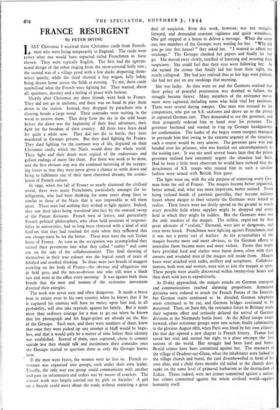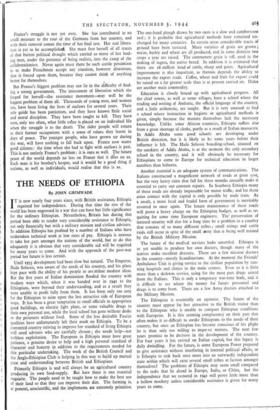FRANCE RESURGENT
By PETER IRVING
IAST Christmas I received three Christmas cards from French- men who were living temporarily in England. The cards were rather what one would have expected exiled Frenchmen to have chosen. They were typically English. The first had the conven- tional design of the robin singing from the snow-covered holly tree ; the second was of a village pond with a few ducks disporting them- selves quietly, while the third showed a hay wagon, fully laden, being drawn home across the fields at evening. To me, those cards symbolised what the French were fighting for. They wanted, above all, quietness, decency and a feeling of peace with honour.
Shortly after Christmas my three friends went back to France. They did not go in uniform, and there was no band to play them down to the station. Instead, they dropped by parachute into a clearing beside a large wood. Their comrades were waiting in the wood to receive them. That drop from the sky in the cold hours before the dawn was the beginning of their final adventure, their fight for the freedom of their country. All three have been dead for quite a while now. They did not die in battle, they were murdered in Gestapo prisons. But they died fighting for France. They died fighting for the common way of life, depicted on their Christmas cards, which the Nazis would deny the whole world. Their fight and their death were typical of the endeavours and gallant endings of many like them. For there was work to be done, and the first obvious step was the continual harassing of the occupy- ing forces so that they were never given a chance to settle down and bring to fulfilment one of their most cherished dreams, the assimi- lation of French culture.
In 1940, when the fall of France so nearly shattered the civilised world, there were many Frenchmen, particularly amongst the in- telligentsia, who had been thinking for some years along lines so similar to those of the Nazis that it was impossible to tell them apart. These men had nothing they wished to fight against. Indeed, they saw their ideas being translated into fact by the onward sweep of the Panzer divisions. French men of letters, and particularly French political philosophers, who often held positions of responsi- bility in universities, had so long been obsessed with a kind of arid fatalism that they had reached the state when they re&oned that any change must be for the better. These men were the real Trojan horse of France. As soon as the occupation was accomplished they turned their pessimism into what they called " reality " and came out on the side of the collaborationists. This final showing of themselves in their true colours was the logical result of years of falsified and crooked thinking. So there were two breeds of maggots crawling on the body of France—the obvious and ubiquitous one in field grey, and the not-so-obvious one who still wore a black suit and went to the office every morning. It was against both these breeds that the men and women of the resistance movement directed their energies.
The work was never easy and often dangerous. It needs a brave man to return even to his own country when he knows that if he is captured his enemies will have no mercy upon him and, in all probability, will also take reprisals against his family. But it needs more than ordinary courage for a man to go, out when he knows that his photograph and his finger-prints are already on the files of the Gestapo. Such men, and there, were numbers of them, knew that once they were picked up any attempt at bluff would be hope- less, and that it would only be a matter of time before their identity was established. Several of them, once captured, chose to commit suicide lest they should talk and incriminate their comrades once the Gestapo started to question them as only the Gestapo knows how.
If the men were brave, the women were no less so. French re- &stance was organised into groups, each under their own leader. Usually, the only way one group could communicate with another and pass on information and orders was by means of couriers. The courier work was largely carried out by girls on bicycles: A girl on a bicycle could move about the roads without attracting a great
deal of suspicion. Even this work, however, was not straight.. forward, and demanded constant vigilance and quick wittedness. One girl stopped at a house to deliver a message. When she came out, two members of the Gestapo were waiting for her.. " Why did you go into that house? " they asked her. " I wanted to adjust ms stockings." The Gestapo checked her papers and finally let her go. She moved away slowly, terrified of hurrying and arousing their suspicions. She could feel that their eyes were following her. As she turned the corner that finally hid her from their sight, she nearly collapsed. She had just realised that as her legs were painted, she had not put on any stockings that morning.
She was lucky. As time went on and the Germans realised that their policy of peaceful penetration was doomed to failure, the struggle became fiercer. Many members of the resistance move- ment were .captured; including some who held vital key positions. There were several daring eseapes. One man was rescued by his compatriots, who put on S.S. uniforms and drove up to the prison in captured German cars. They demanded to see the governor, and then arrogantly ordered him to hand over his prisoner. The governor hesitated and wanted to ring up Gestapo headquarters for confirmation. The leader of the bogus storm troopers managed to persuade him that 'owing to the extreme urgency of the situation, such a course would be very unwise. The governor gave way and handed over his prisoner, who was hustled out unceremoniously to the waiting cars. It was not until several hours later that the prison governor realised how extremely' urgent the situation had been. Had he been a little more observant he would have noticed that the detachment of S.S. troops who treated him in such a cavalier fashion were armed with British Sten guns.
The fight went on, with the sole purpose of removing every Ger- man from the soil of France. The maquis became better organised, better armed, and, what was more important, better trained. From being isolated bands of patriotic guerrillas, they became military forces whose danger to their security the Germans- were forced to realise. Their forces were too thinly spread on the ground to watch every possible field where supplies might be dropped and every field in which they might be hidden. But the Germans were not the only enemies of the maquis. The militia, organised by that great advocate of " realism," Darnand, were just as dangerous, and even more hated. Frenchmen were fighting against Frenchmen, and it was not a pretty sort of warfare. As the potentialities of the maquis became more and more obvious, so the German efforts to neutralise them became more and more violent. Farms that might have provided food and shelter were burnt down, often with their owners and wounded men of the maquis still inside them. Maquis bases were attacked with tanks, artillery and aeroplanes. Collabora- tionists, both men and women, were sent to join the maquis as spies. These people were usually discovered within twenty-four hours and then dealt with just as expeditiously. .
As D-day, approached, the maquis attacks on German transport and communications reached alarming proportions. Armoured divisions were ordered to attack the French Forces of the Interior, but German trains continued to be derailed, German telephone wires continued to be cut, and German bridges continued to be destroyed. Then, on June 6th, the resistance forces in Brittany made their supreme effort and seriously delayed the arrival of German divisions at the Normandy battle front. As the Allied troops swept forward, other resistance groups went into action, finally culminating in the glorious August 18th, when Paris was ffeed by her own citizens. On that day opened a new chapter in French history. France had saved her soul and earned her right to a place amongst the free nations of the world. Her struggle had been hard and bitter. Bestial crimes have been committed against her. The massacre of the village of Oradour-sur-Glane, when the inhabitants were locked in the village church and burnt, the cure disembowelled in front of his own altar, and a child three months old nailed to the church door, ranks on the same level of primeval barbarism as the destruction of Lidice. These, indeed, were not crimes committed against a nation, but crimes committed against the whole civilised world—against humanity itself.
France's struggle is not yet over. She has contributed in no small measure to the rout of the Germans from her country, and with their removal comes the time of her final test. Her real libera- tion is yet to be accomplished. She must free herself of all traces of that barren political thought which carried so many of her lead- ing men, under the pretence of being realists, into the camp of the collaborationists. Never again must there be such sterile pessimism as to make Frenchmen accept any situation, however disastrous, that is forced upon them, because they cannot think of anything better for themselves.
But France's biggest problem may not lie in the difficulty of find- ing a strong government. The instrument of liberation which she forged for herself—the resistance movement—may well be the biggest problem of them all. Thousands of young men, and women too, have been living the lives of outlaws for several years. Their sole guide has been patriotism, and they have known little social and moral discipline. They have been taught to kill. They have seen, only too often, what little value is placed on an individual life when the struggle is to the death. The older people will return to their former occupations with a sense of values they learnt in days of peace. The younger people, who have grown up during the war, will have nothing to fall back upon. France now wants good citizens: the time when she had to fight with outlaws is past. This is not entirely France's problem: it is ours as well.pe future peace of the world depends no less on France that it dSes on us. Each man is his brother's keeper, and it would be a good thing if nations, as well as individuals, would realise that this is so.



























 Previous page
Previous page